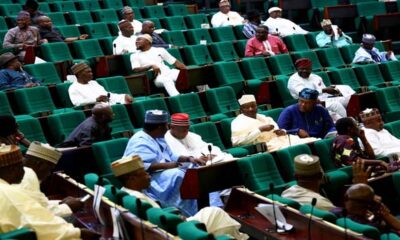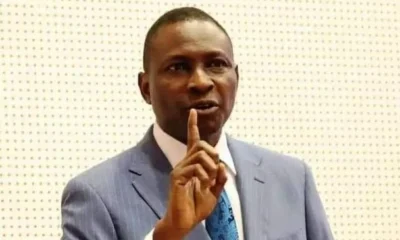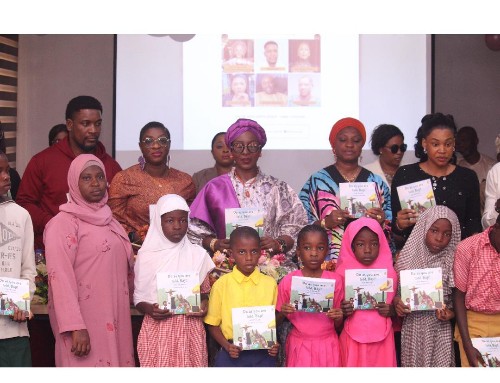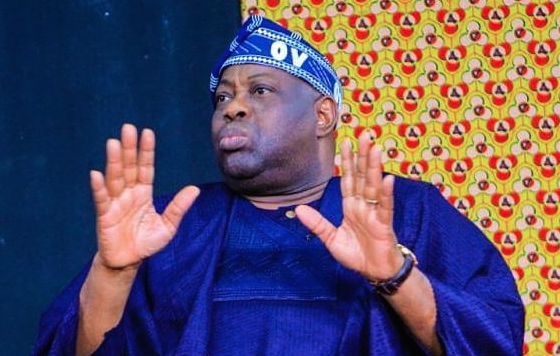The suspended acting chairman of the Economic and Financial Crimes Commission (EFCC), Ibrahim Magu, has denied more accusations levelled against him of corruption in his capacity as the anti-graft boss.
Mr Magu, who spoke through his lawyer, Wahab Shittu, via a statement Sunday, refuted reports of him misappropriating N329 billion recovered funds for the Nigerian National Petroleum Corporation, (NNPC).
He explained that he remitted the reported N329 billion from indebted oil marketers into the Nigerian National Petroleum Corporation accounts – which the receipt of such payments was confirmed by the NNPC.
“The truth of the matter is that well over N329 billion recovered by EFCC under our client’s watch was remitted directly into NNPC dedicated accounts via Remita under a special arrangement endorsed by NNPC, EFCC, and the affected NNPC’s indebted marketers.
“By virtue of the said special arrangement, NNPC had requested formally the EFCC to recover the said amount from the affected NNPC’s marketers who were expected to pay such funds directly to NNPC while NNPC, in turn, confirmed receipt of such payments to EFCC,” the statement partly reads.
“Therefore, EFCC never took custody of any of the recovered funds and so, the question of misappropriation of such funds by EFCC or our client could not have arisen as falsely published,” he said.
Mr Magu is currently being investigated by a panel headed by a former president of the appeal court, Ayo Salami, over allegations of corruption and insubordination levelled against him by the Attorney General of the Federation, Abubakar Malami. He was detained for about 10 days before his release.
After his arrest, allegations that Mr Magu diverted billions of naira from recovered funds, as well as the interests accruing from the funds, have since circulated and published on various media platforms.
In Mr Magu’s response, he described the reports as “gross misrepresentation and blatant falsehood”, saying such allegations never featured in the ongoing proceedings probing him.
Also in the statement, he vowed to henceforth respond to all false allegations orchestrated against him on a daily basis, as well as presenting evidence for his defence.
”Take notice that our client can no longer fold his hands in the face of these sustained malicious attacks to prejudge him in the public space. Our client will henceforth, point by point reply to all false allegations orchestrated against him in the public space on a daily basis as well as present his comprehensive defence for the world to see,” he said through his lawyer.
”This is without prejudice to the willingness of our client to defend himself in the ongoing proceedings at the Presidential Investigation Panel.
“We appreciate your commission’s professional and diligent handling of the recovery of debts from the marketers throughout the period and we look forward to furthering collaboration in further areas.
“The issue of NNPC recovered funds has never featured in the proceedings of the panel and our client has never been confronted with such wild allegations. He said.
Also responding to allegations that he was shielding corrupt persons in the Federal Inland Revenue Service (FIRS) from prosecution, Mr Magu said it is “falsehood from the pit of hell”.
“Investigations were painstakingly conducted by EFCC under our client’s watch. The matter has since been referred for prosecution. Charges have been prepared ahead of arraignment in court,” he said.
“Our client has no interest in shielding anyone found culpable from the long arms of the law. At any rate, time does not run against the state in criminal prosecutions. It is tendentiously wicked to suggest that our client excluded major approving authorities from the criminal process.
“As a matter of fact, one Peter Hena, head of the FIRS coordinator support services group, who allegedly authorised the illegal payment is one of those listed to be arraigned. The case was properly investigated and professionally vetted with our client deploying no influence whatsoever on the outcome.”

 BIG STORY4 days ago
BIG STORY4 days ago
 BIG STORY3 days ago
BIG STORY3 days ago
 BIG STORY4 days ago
BIG STORY4 days ago
 BIG STORY4 days ago
BIG STORY4 days ago
 BIG STORY3 days ago
BIG STORY3 days ago
 BIG STORY16 hours ago
BIG STORY16 hours ago
 BIG STORY16 hours ago
BIG STORY16 hours ago
 BIG STORY15 hours ago
BIG STORY15 hours ago



























